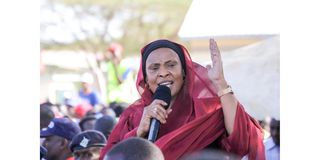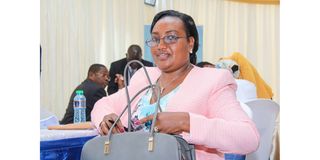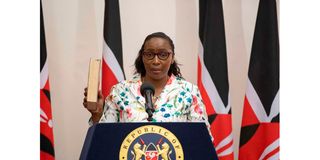Why August poll should inspire parties to nominate more women

Isiolo Senator Fatuma Adan Dullo.
What you need to know:
- Naomi Waqo's nomination to the Senate in 2017 has created a formidable female politician in Marsabit County.
- That nomination of women by political parties to Parliament and county assemblies has borne fruit is not in doubt.
When Naomi Jillo Waqo was nominated to the Senate in 2017, the Anglican Church reverend was a political greenhorn.
By the time she had done three years in mainstream politics as a Jubilee Party senator, she had undergone the proverbial baptism by fire. Alongside a handful of colleagues in the House, they were faced with expulsion from the party and ultimately, from the Senate. They were caught in the midst of a falling-out within the top leadership of the ruling party, pitting President Uhuru Kenyatta against his Deputy William Ruto. They survived.
That is history. The outgoing senator flung herself into elective politics and ran for the Marsabit woman rep seat in the August election and won on a UDA ticket.
Her nomination to the Senate, the political inexperience then, notwithstanding, has created a formidable female politician in Marsabit County.
Similarly, in 2013, Jubilee Party nominated a former provincial administrator and human rights campaigner in Fatuma Dullo. From a largely conservative community in Isiolo County, Senator Dullo then made a go at the seat in 2017. She made history as the first woman elected to Parliament, (apart from the exclusive County MP). In the just-concluded election, she defended her seat and won.

Marsabit Woman Representative Naomi Jillo Waqo.
Beatrice Elachi, the incoming MP for Dagoretti North, Nairobi County, also cut her political teeth in the Senate where she was first appointed by outgoing Governor Kiraitu Murungi’s Alliance Party of Kenya in 2013. She was then the party’s treasurer.
A stint as the Nairobi County Speaker after 2017 election and the Department of Gender’s Chief Administrative Secretary (CAS), Ms Elachi is among the 29 women just elected to the National Assembly to represent constituencies, an unprecedented number in that House.

In Nakuru County, Martha Wangari emerged victorious for a second term as the MP for Gilgil. The former University of Nairobi student leader got into active politics when she led groups of young women, ‘Warembo na Kibaki’, to campaign for President Mwai Kibaki. In 2013, Musalia Mudavadi’s then-United Democratic Forum (UDF) nominated her to the Senate. Ms Wangari then used her experience in the Senate as a stepping stone for re-election as an MP, in a highly contested, male-dominated race, to win a second term.

Gilgil Member of Parliament Martha Wangari.
Then, Florence Jematia and Wanjiku Muhia, who had been nominated to the East Africa Legislative Assembly (EALA) by Jubilee Party, won Baringo woman representative and Kipipiri Constituency seats, respectively. Ms Muhia has made history as the first woman in the county to be elected from a constituency.
That nomination of women by political parties to Parliament and county assemblies has borne fruit is not in doubt. The above examples are proof and reason why political parties should derive inspiration to nominate women to the legislature in big numbers. They have effectively used Parliament and county legislatures as training pad to electoral positions.
Progressive political parties should pick up from the encouraging election of an unprecedented numbers of women and be intentional in nominating more to ensure gender equity and balanced representation in politics.
The fact that a number of other former female legislators elected as women representatives have successfully competed with male counterparts in single member constituencies, speaks of the critical importance of that position. It is more remarkable that some of the women in this category only served in this affirmative seat for only one term and moved over to the constituency.
Training ground
They include Ruweida Obo now MP for Lamu East. Ms Obo has rightfully argued that the woman rep seat need to be a training ground to get more women in Parliament, thus her move to contest in the constituency. The new MPs for Kisumu West and Githunguri, Rosa Buyu and Gathoni Wamuchomba, respectively, served one term each from 2017 as their counties’ women reps.
Another highlight of the 2022 General Election is the handful of young women professionals who plunged into the rough terrain that is Kenya’s politics. The result is new faces to the 13th Parliament in 24-year-old Linet Chepkorir ‘Toto’ of Bomet County, Kirinyaga County’s Jane Njeri Maina (28), and Lamu County’s Muthoni Maribu, a 30-year-old who ran as an independent. The three are among the legislators to watch out for in the country’s political journey.
Businesswoman Tabitha Karanja Keroche’s win as the senator of Nakuru County, in her first attempt, was another highpoint in the election. Equally, the return to the National Assembly of Mary Emase and Alice Ng’ang’a as Teso South and Thika Town MPs, is noteworthy and outstanding. Elected in 2013, the two lost in the preceding 2017 elections.
Congratulations and best wishes are in order to all the newly elected female legislators.
Ms Rugene is a former Nation Parliamentary Editor and founder, the Woman’s Newsroom Foundation. Email: [email protected]





